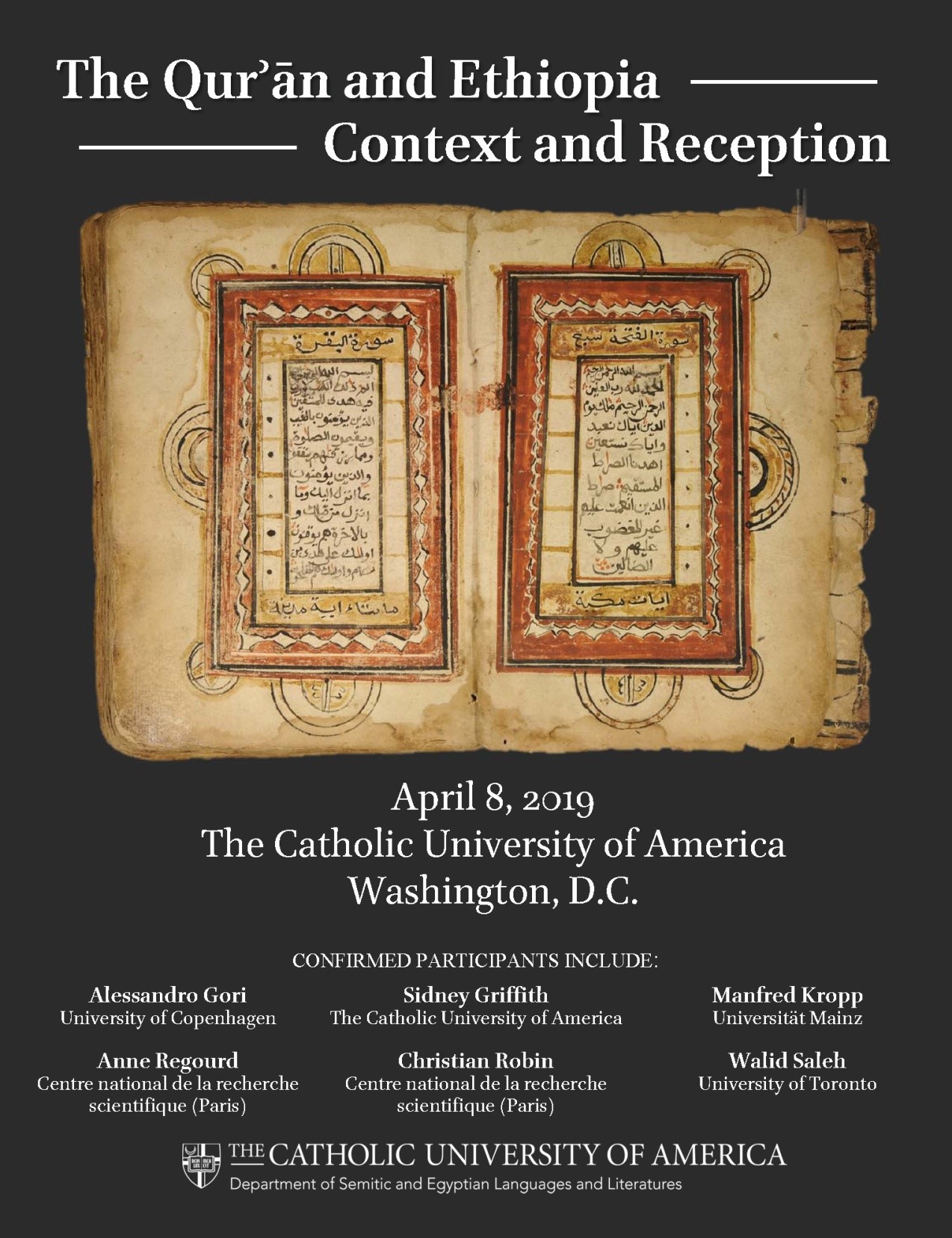Call for Papers: The Qur’ān and Ethiopia: Context and Reception
Submissions are solicited for a one-day symposium on ‘The Qurʾān and Ethiopia: Context and Reception’, which will be held at The Catholic University of America (Washington, DC USA) on Monday, April 8, 2019.

Connections between the Qurʾān and Ethiopia are vast and varied. On the one hand, Ethiopia provides an important historical context (among many others) for understanding the Qurʾān in its Late Antique milieu. After all, throughout Late Antiquity, Ethiopia was a major political power, situated just across the Red Sea from the Arabian Peninsula. Occasionally, Ethiopia even interceded directly in affairs in the peninsula, as evidenced above all by the Najrān episode. In addition, Islamic literature relays many connections that Muḥammad and his followers had with Ethiopia, including most famously the first Ḥijrah in which companions of the prophet sought refuge in Ethiopia. Thus, it comes as no surprise that there are Ethiopic loanwords in the Qurʾān, perhaps none more saliently than the Ethiopic word maʾǝdd ‘table, Eucharist’, which is found as the name of the fifth sūrah (al-Māʾidah). While Ethiopic loanwords in the Qurʾān have long been known, a number of questions remain: What do these loanwords tell us about the context in which the Qurʾān came into existence? And, more broadly and significantly, can we move beyond loanwords? That is, what are the other ways in which Ethiopia may provide a context for understanding the Qurʾān in its historical setting?
On the other hand, the Qurʾān also had—and still has—a reception in Ethiopia. Modern day Ethiopia is home to a sizable Muslim community: The 2007 census reported that just over one-third of the country’s ca. 74 million inhabitants identified as Muslim. Similarly, in neighboring Eritrea, which is historically part of the ancient kingdom of Axum, almost half of the ca. 5.5 million inhabitants in 2011 were Muslim, according to a report by the U.S. Department of State. These modern Muslim populations have historical antecedents stretching back to the rise of Islam. Thus, Ethiopia provides fertile ground for studying the reception of the Qurʾān for well over a millennium. The reception of the Qurʾān in Ethiopia is an especially opportune topic for a symposium at The Catholic University of America, which thanks to a recent gift by Gerald and Barbara Weiner now holds an invaluable collection of more than 175 Arabic manuscripts from Ethiopia, including a number of copies of the Qurʾān as well as exegetical works (tafsīr). Thus, ultimately, this symposium aims to locate the Qurʾān in Ethiopia, both as a context for its early development and as a location for its later reception.
Abstracts describing the precise topic treated with a length of approximately 200-300 words can be sent as an electronic version (pdf and MS word document) to Aaron Butts (buttsa@cua.edu). The deadline for submission is November 1, 2018.
Papers presented at the symposium will be considered for publication in an edited volume, which aims to make this interesting topic available to a wider audience.
Questions can be addressed to:
Dr. Aaron Butts
Assistant Professor of Semitic Languages and Literatures
Department of Semitic and Egyptian Languages and Literatures
The Catholic University of America
buttsa@cua.edu
© International Qur’anic Studies Association, 2018. All rights reserved.
